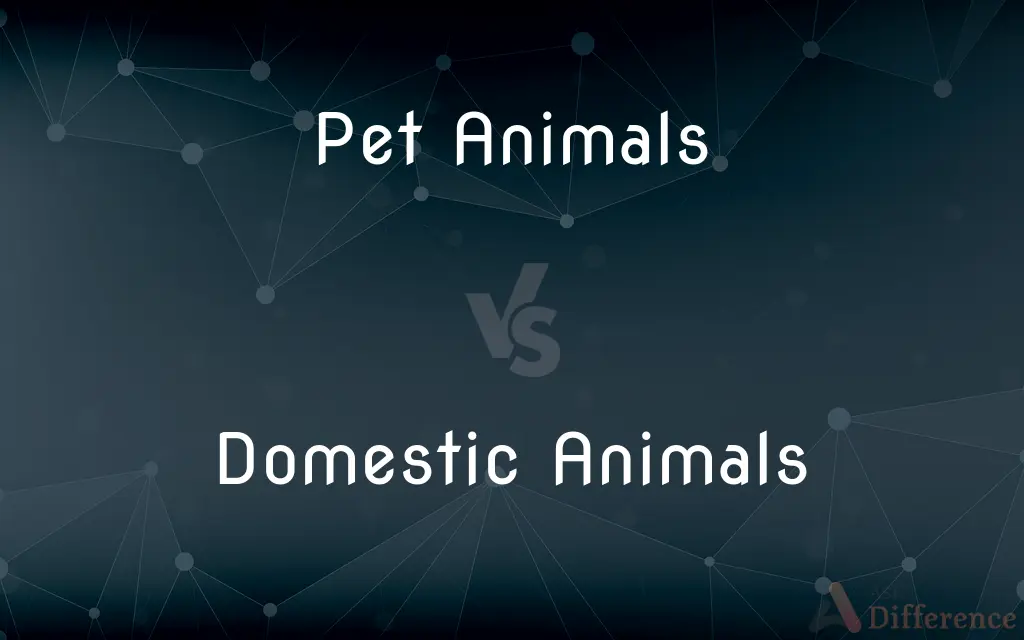Pet Animals vs. Domestic Animals — What's the Difference?
Edited by Tayyaba Rehman — By Fiza Rafique — Published on December 7, 2023
Pet animals are kept for companionship and enjoyment, while domestic animals are tamed for work, food, or other utility.

Difference Between Pet Animals and Domestic Animals
Table of Contents
ADVERTISEMENT
Key Differences
Pet animals, as the term suggests, are animals kept primarily for the joy, companionship, and emotional connection they offer. Domestic animals, on the other hand, are broader in scope and include animals that humans have tamed for various purposes, which might include companionship but can also encompass work, production of materials, or as a food source.
While many pet animals can also be domesticated, not all domestic animals are considered pets. Pet animals typically live closely with humans, often sharing living spaces, and their main role is to provide company. Domestic animals, on the other hand, may or may not live closely with humans and are primarily kept for utility purposes.
Dogs and cats are classic examples of pet animals that many families nurture with love and affection. In contrast, domestic animals can range from livestock such as cows, chickens, and goats, to animals like horses used for transportation or labor. Both pet animals and domestic animals have been essential to human civilization, but for different reasons.
The relationship between humans and pet animals is often emotional and based on mutual affection. This contrasts with many domestic animals, where the relationship is often based on utility and economic value. Both pet animals and domestic animals play unique roles in human society and have evolved with us over millennia.
While the line between pet animals and domestic animals can sometimes blur, as some people might keep chickens both for their eggs and as pets, it's crucial to understand the primary reasons for keeping the animal. Both pet animals and domestic animals have different needs, rights, and roles in human culture.
ADVERTISEMENT
Comparison Chart
Purpose
Companionship and enjoyment
Work, food, or other utility
Relationship with Humans
Emotional and based on mutual affection
Often based on utility and economic value
Living Arrangements
Typically share living spaces with humans
May or may not live closely with humans
Examples
Dogs, cats, parrots
Cows, chickens, horses, sheep
Dependency on Humans
Reliant on humans for emotional needs and care
Reliant on humans for care, breeding, and tasks
Compare with Definitions
Pet Animals
Pet animals are not typically used for labor or utility but for emotional connection.
Fish, as pet animals, bring tranquility to a home but don't serve a utilitarian purpose.
Domestic Animals
Domestication of animals has played a critical role in human civilization's advancement.
Without the help of domestic animals like oxen for plowing, agriculture might have evolved differently.
Pet Animals
Pet animals often live within human households.
Hamsters, a common choice of pet animals, often reside in cages within children's rooms.
Domestic Animals
Domestic animals serve varied roles, from food production to transportation.
Horses, being domestic animals, have historically been used for both labor and transportation.
Pet Animals
Pet animals require emotional care and bonding.
Spending quality time playing with pet animals strengthens the bond between owner and pet.
Domestic Animals
Domestic animals can sometimes also be pets but are primarily kept for utility.
While some people have pigs as pets, many more raise these domestic animals for meat.
Pet Animals
The health and well-being of pet animals often become a primary concern for their owners.
Owners regularly visit the vet to ensure their pet animals are in good health.
Domestic Animals
Domestic animals are species that have been tamed and bred by humans for specific purposes.
Sheep, as domestic animals, are often raised for wool and meat.
Pet Animals
Pet animals are creatures kept primarily for personal enjoyment and companionship.
Many people find comfort and joy in having pet animals like cats or dogs at home.
Domestic Animals
Domestic animals can adapt to life in captivity and are bred to enhance specific traits.
Chickens, as domestic animals, are bred for either meat or egg production.
Common Curiosities
What are pet animals primarily kept for?
Pet animals are primarily kept for companionship and personal enjoyment.
Can a domestic animal also be a pet animal?
Yes, some domestic animals like dogs or cats can also be kept as pets for companionship.
Are all pet animals also domestic animals?
While most pet animals are domesticated, not all domestic animals are kept as pets.
What roles do domestic animals usually serve?
Domestic animals can serve various roles, including food production, labor, transportation, or material production.
Do pet animals have rights?
Yes, many countries have laws ensuring the humane treatment and welfare of pet animals.
Can any wild animal be turned into a pet animal?
Not all wild animals can or should be kept as pets due to their specific needs, potential dangers, and ethical concerns.
Do pet animals have specific emotional needs?
Yes, pet animals often require emotional care, bonding, and regular interaction with their human companions.
How do domestic animals differ from wild animals?
Domestic animals have been tamed and bred by humans for specific purposes, while wild animals live independently of humans in their natural habitats.
Is it necessary for pet animals to live inside homes?
While many pet animals live inside homes, some, like certain breeds of dogs or outdoor cats, might spend significant time outside.
How have domestic animals impacted human civilization?
Domestic animals have significantly impacted agriculture, transportation, and economy, playing pivotal roles in human advancement.
How long have humans been domesticating animals?
Humans have been domesticating animals for thousands of years, with dogs believed to be among the first.
Are farm animals considered domestic animals?
Yes, farm animals like cows, pigs, and chickens are considered domestic animals.
How do we differentiate between pet animals and domestic animals in terms of purpose?
Pet animals are primarily for companionship, while domestic animals are tamed for work, food, or other utility.
Can exotic animals be considered pet animals?
While some people keep exotic animals as pets, it often comes with ethical, legal, and welfare concerns.
Are there benefits to keeping pet animals?
Yes, pet animals can offer companionship, reduce stress, and improve emotional well-being among other benefits.
Share Your Discovery

Previous Comparison
Balance Sheet vs. Cash Flow Statement
Next Comparison
NPV vs. XNPVAuthor Spotlight
Written by
Fiza RafiqueFiza Rafique is a skilled content writer at AskDifference.com, where she meticulously refines and enhances written pieces. Drawing from her vast editorial expertise, Fiza ensures clarity, accuracy, and precision in every article. Passionate about language, she continually seeks to elevate the quality of content for readers worldwide.
Edited by
Tayyaba RehmanTayyaba Rehman is a distinguished writer, currently serving as a primary contributor to askdifference.com. As a researcher in semantics and etymology, Tayyaba's passion for the complexity of languages and their distinctions has found a perfect home on the platform. Tayyaba delves into the intricacies of language, distinguishing between commonly confused words and phrases, thereby providing clarity for readers worldwide.












































